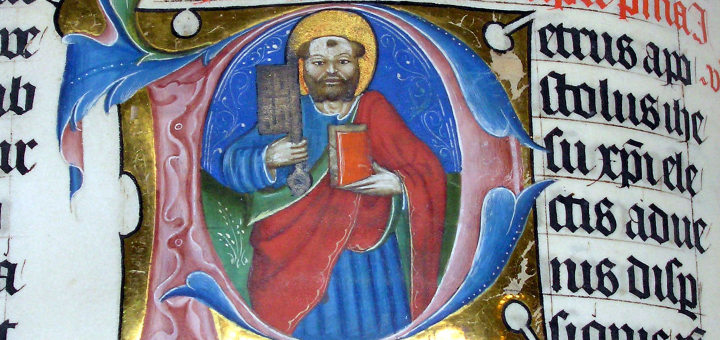
Editor's note: Sr. Margaret Kerry, whose column is usually found in this space, was unable to make it this week, but she arranged for a substitute: Sr. Mary Lea Hill, fsp. -Barb
 Public Domain, Link[/caption]
We Christians are known to be people of good news: people of God’s Good News. How often do we consider these powerful little words: good and news? Both are among the most overused words in the English language.
Classic introduction: “How are you?” “Good!”
Classic advice: “I only want you hanging around with good kids.”
Classic quote (from G.K. Chesterton): “The word good has many meanings. For example, if a man were to shoot his grandmother at a range of five hundred yards, I should call him a good shot, but not necessarily a good man.”
The dictionary offers lots of options for using the word good: proper, expedient, commendable, worthy, morally excellent, virtuous, efficient, competent, thorough, considerable, valid, genuine, financially sound, not less than (as in: I waited a good hour), etc. All in all, a pretty good word, this word good! But, also so commonly used, while we ignore all those synonyms, that it suggests either a poor vocabulary or just a weak imagination. So, why do we call the major books of Scripture, simply, the Good News?
And what about news? What makes something news?
Public Domain, Link[/caption]
We Christians are known to be people of good news: people of God’s Good News. How often do we consider these powerful little words: good and news? Both are among the most overused words in the English language.
Classic introduction: “How are you?” “Good!”
Classic advice: “I only want you hanging around with good kids.”
Classic quote (from G.K. Chesterton): “The word good has many meanings. For example, if a man were to shoot his grandmother at a range of five hundred yards, I should call him a good shot, but not necessarily a good man.”
The dictionary offers lots of options for using the word good: proper, expedient, commendable, worthy, morally excellent, virtuous, efficient, competent, thorough, considerable, valid, genuine, financially sound, not less than (as in: I waited a good hour), etc. All in all, a pretty good word, this word good! But, also so commonly used, while we ignore all those synonyms, that it suggests either a poor vocabulary or just a weak imagination. So, why do we call the major books of Scripture, simply, the Good News?
And what about news? What makes something news?
 Bl. James Alberione. Image courtesy of the Daughters of St. Paul. All rights reserved. Used with permission.[/caption]
Blessed James Alberione, our founder, was a true disciple of the Word. Among his many writings on God’s Word is this favorite of mine:
Bl. James Alberione. Image courtesy of the Daughters of St. Paul. All rights reserved. Used with permission.[/caption]
Blessed James Alberione, our founder, was a true disciple of the Word. Among his many writings on God’s Word is this favorite of mine:
Copyright 2019 Sr. Mary Lea Hill, fsp About the author: Sr. Mary Lea Hill, a member of the Daughters of St. Paul since 1964, has enjoys communicating the faith. Her skills as a story teller were honed as director of audiovisual productions. An editor and author for many years, Sister Mary Lea has written several popular books including Blessed Are the Stressed and Prayer and You published by Pauline Books & Media www.pauline.org
About the author: Sr. Mary Lea Hill, a member of the Daughters of St. Paul since 1964, has enjoys communicating the faith. Her skills as a story teller were honed as director of audiovisual productions. An editor and author for many years, Sister Mary Lea has written several popular books including Blessed Are the Stressed and Prayer and You published by Pauline Books & Media www.pauline.org
 Public Domain, Link[/caption]
We Christians are known to be people of good news: people of God’s Good News. How often do we consider these powerful little words: good and news? Both are among the most overused words in the English language.
Classic introduction: “How are you?” “Good!”
Classic advice: “I only want you hanging around with good kids.”
Classic quote (from G.K. Chesterton): “The word good has many meanings. For example, if a man were to shoot his grandmother at a range of five hundred yards, I should call him a good shot, but not necessarily a good man.”
The dictionary offers lots of options for using the word good: proper, expedient, commendable, worthy, morally excellent, virtuous, efficient, competent, thorough, considerable, valid, genuine, financially sound, not less than (as in: I waited a good hour), etc. All in all, a pretty good word, this word good! But, also so commonly used, while we ignore all those synonyms, that it suggests either a poor vocabulary or just a weak imagination. So, why do we call the major books of Scripture, simply, the Good News?
And what about news? What makes something news?
Public Domain, Link[/caption]
We Christians are known to be people of good news: people of God’s Good News. How often do we consider these powerful little words: good and news? Both are among the most overused words in the English language.
Classic introduction: “How are you?” “Good!”
Classic advice: “I only want you hanging around with good kids.”
Classic quote (from G.K. Chesterton): “The word good has many meanings. For example, if a man were to shoot his grandmother at a range of five hundred yards, I should call him a good shot, but not necessarily a good man.”
The dictionary offers lots of options for using the word good: proper, expedient, commendable, worthy, morally excellent, virtuous, efficient, competent, thorough, considerable, valid, genuine, financially sound, not less than (as in: I waited a good hour), etc. All in all, a pretty good word, this word good! But, also so commonly used, while we ignore all those synonyms, that it suggests either a poor vocabulary or just a weak imagination. So, why do we call the major books of Scripture, simply, the Good News?
And what about news? What makes something news?
- The news is information about what has happened recently: anything from a major crisis to a local garden party;
- The news is what is reported by the various media: tv, radio, print, online, in-ear, and of course, by word of mouth.
-
- short: the essential
- simple: the human interest
- strong: the unique angle
“In many and various ways God spoke of old to our fathers by the prophets, but in these last days he has spoken to us by a Son” (Heb.1:1-2). Christ, the Son of God made man, is the Father’s one, perfect, and unsurpassable Word. In him he has said everything; there will be no other word than this one. (65)So God has a message:
- short: The Kingdom is at hand!
- simple: We need only repent and believe!
- strong: God visited his people!
- And all this in a single Word – a power-filled, Living Word
 Bl. James Alberione. Image courtesy of the Daughters of St. Paul. All rights reserved. Used with permission.[/caption]
Blessed James Alberione, our founder, was a true disciple of the Word. Among his many writings on God’s Word is this favorite of mine:
Bl. James Alberione. Image courtesy of the Daughters of St. Paul. All rights reserved. Used with permission.[/caption]
Blessed James Alberione, our founder, was a true disciple of the Word. Among his many writings on God’s Word is this favorite of mine:
“The Latin liturgy contains the phrase, Edidit nobis Salvatorem: The Virgin Mother gave us the Savior. The verb edidit is used.” [Pr 1954 137] “Publishers (take a word), multiply it and distribute it clothed in paper, type and ink. On the human level, they have the mission that Mary had on the divine level. She was the Mother of the Divine Word. She contained the invisible God and made Him visible and accessible to men by presenting Him in human flesh.” [CISP 599]In other words, Mary edited God’s Word in her womb and published Him at His birth. And this at what Scripture calls the fullness of time. God shows Himself savvy about another publishing principle: timing is important. One of the great Scripture scholars, Rene Latourelle, tells us to watch Jesus in the Gospels. Observe how He does what He teaches. “He went about doing good” (Acts 10:38) in order to give us an example” (Jn 13:15). So this Word made flesh, this Word of the Father to us, is engaging us through the Gospels. These four books aren’t just to be admired, but they are to be lived. “He went about doing good.” He went about showing us who we are, the reconditioned us. We, too, become the Good News. The holy martyr, Archbishop Oscar Romero reminds us that “Jesus Christ and the gospel are not two separate things. The gospel is not a biography of Christ; for St. Paul, the gospel is the living power of God. […] Christ is God’s homily preaching to you while you try to fill yourself with the divine power that has come in Christ Jesus.” While I share the good news, I am going to be the gospel. I am Good News. Go preach and if need be, use words, said St. Francis. Be evangelization. It is the most effective means, as illustrated by God Himself, in the incarnation, He is the Good News. This is our job, this is our calling, our identity. When people see us as Good News they will ask for the gospel book. We are Good News incorporated. We bring Good News on paper and in person by our presence. What does Good News ask of us? To be lived. As Paul said, “It is no longer I, but Christ living in me” (Gal 2:20). The best way to give the Gospel is to be the Good News. We spread God’s Word best by illustrating it with our own lives.
Copyright 2019 Sr. Mary Lea Hill, fsp
 About the author: Sr. Mary Lea Hill, a member of the Daughters of St. Paul since 1964, has enjoys communicating the faith. Her skills as a story teller were honed as director of audiovisual productions. An editor and author for many years, Sister Mary Lea has written several popular books including Blessed Are the Stressed and Prayer and You published by Pauline Books & Media www.pauline.org
About the author: Sr. Mary Lea Hill, a member of the Daughters of St. Paul since 1964, has enjoys communicating the faith. Her skills as a story teller were honed as director of audiovisual productions. An editor and author for many years, Sister Mary Lea has written several popular books including Blessed Are the Stressed and Prayer and You published by Pauline Books & Media www.pauline.org
About the Author

Sr. Margaret Kerry, fsp
A Daughter of St. Paul for 40 years Sr. Margaret continues to pursue new ways to proclaim the Gospel: sharing the Pauline Charism with the laity, writing books (St. Anthony of Padua: Fire & Light; Strength in Darkness: John of the Cross; Prayers for the New Evangelization), & through direct evangelization. She is available for workshops on the Vocation & Mission of the Laity, Media Literacy, and The New Evangelization. mkerry@paulinemedia.com


.png?width=1806&height=731&name=CatholicMom_hcfm_logo1_pos_871c_2728c%20(002).png)
Comments